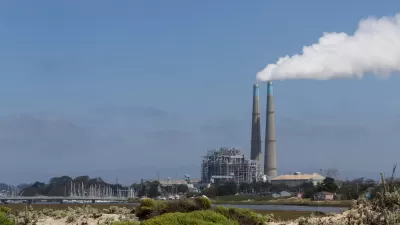Earlier this month the Energy Department pulled the plug on the FutureGen "clean coal" project. The media has been sifting through the ashes to make sense of where the project went wrong.
Timothy Cama sets the stakes in the demise of FutureGen, a much ballyhooed "clean coal" project once thought of as the future of the fossil fuel industry: "The Energy Department’s decision this week to pull the plug on a major 'clean coal' demonstration project stands as the latest setback for a technology that only recently held promise as a key piece of the United States’ fight against climate change."
Cama's coverage of the project's demise explores the response of industry groups, which "are seizing on the decision to scrap the years-old initiative as more evidence of the Obama administrations 'war on coal.'" Cama, however, quotes Howard Herzog, a research engineer at the Massachusetts Institute of Technology, to express some skepticism of that charge.
Joe Romm covers the challenges facing carbon capture and sequestration (CCS) technology, which was meant to have its largest-scale showcase with the FutureGen project. According to Romm, "CCS is unlikely to provide more than 10 percent of the answer to the carbon problem by 2050" because of lackluster interest in the technology from the private sector.
Valerie Vocovici and Ayesha Rocce report on the legal implications of the decision to pull the plug on the project—especially that the decision might bolster the case of legal challenges to the U.S. EPA's proposed regulations for coal plant carbon emissions.
FULL STORY: Clean coal setback fuels industry attacks

Maui's Vacation Rental Debate Turns Ugly
Verbal attacks, misinformation campaigns and fistfights plague a high-stakes debate to convert thousands of vacation rentals into long-term housing.

Planetizen Federal Action Tracker
A weekly monitor of how Trump’s orders and actions are impacting planners and planning in America.

Chicago’s Ghost Rails
Just beneath the surface of the modern city lie the remnants of its expansive early 20th-century streetcar system.

Bend, Oregon Zoning Reforms Prioritize Small-Scale Housing
The city altered its zoning code to allow multi-family housing and eliminated parking mandates citywide.

Amtrak Cutting Jobs, Funding to High-Speed Rail
The agency plans to cut 10 percent of its workforce and has confirmed it will not fund new high-speed rail projects.

LA Denies Basic Services to Unhoused Residents
The city has repeatedly failed to respond to requests for trash pickup at encampment sites, and eliminated a program that provided mobile showers and toilets.
Urban Design for Planners 1: Software Tools
This six-course series explores essential urban design concepts using open source software and equips planners with the tools they need to participate fully in the urban design process.
Planning for Universal Design
Learn the tools for implementing Universal Design in planning regulations.
planning NEXT
Appalachian Highlands Housing Partners
Mpact (founded as Rail~Volution)
City of Camden Redevelopment Agency
City of Astoria
City of Portland
City of Laramie



























